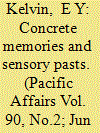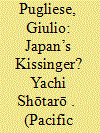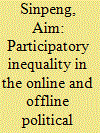|
|
|
Sort Order |
|
|
|
Items / Page
|
|
|
|
|
|
|
| Srl | Item |
| 1 |
ID:
154265


|
|
|
|
|
| Summary/Abstract |
This paper interrogates how Singapore’s everyday heritage has been framed through embodied and sensory experiences. While buildings and other landmarks have been conserved as heritage icons, this designation also includes particular routes known as heritage trails. Buildings and trails by themselves are not invested with symbolic meaning; it is the processes of heritage packaging that consign particular landmarks and sites with a heritage purpose. By employing the notion of “concrete memories,” I argue that heritage landmarks and trails form a site through which the nation’s history is selectively interpreted, negotiated, and experienced by different actants. Concrete memories comprise three key features: familiarity, sensory remembering, and ownership. The discussion of concrete memories is undergirded by broad methodological principles of actor-network theory. The intention is to call attention to embodied tourism in heritage tourism studies while at the same time addressing the production and consumption of heritage and power relations through heritage networks.
|
|
|
|
|
|
|
|
|
|
|
|
|
|
|
|
| 2 |
ID:
154266


|
|
|
| 3 |
ID:
154259


|
|
|
|
|
| Summary/Abstract |
This article reassesses the 2006 and, tentatively, the 2014 reset in Sino-Japanese relations to argue in favour of an increasingly state-centric understanding of Japanese diplomacy. By making use of a narrative account and a variety of primary sources—including personal memoirs, elite interviews, participatory observation, and leaked State Department cables—this article finds that Abe Shinzō’s foreign policy confidante, Yachi Shōtarō, embodied the unmatched influence of government actors in Japan’s political landscape. The article provides a close-up portrait of Yachi, with an emphasis on his preference for geopolitics, strategy, and secret diplomacy. Yachi and the institutional apparatus he represented sought détente with Japan’s main strategic adversary, while pushing for geopolitical initiatives that targeted China. The article concludes by arguing that the Abe administration’s insistence on, and institutionalized practice of, conducting public affairs in secret will likely further strengthen the role of the nation-state and of government actors in Japan, also in light of growing geopolitical tensions in East Asia.
|
|
|
|
|
|
|
|
|
|
|
|
|
|
|
|
| 4 |
ID:
154261


|
|
|
|
|
| Summary/Abstract |
Does social media reinforce or transcend socioeconomic divides in political participation? The mobilization thesis suggests that social media use can bring previously disengaged or under-represented groups into politics. The reinforcement thesis, in contrast, posits that social media has little impact on existing patterns of political participation and can, in fact, exacerbate them. I test these two hypotheses in the context of street protests in Thailand which occurred from November 2013 through March 2014. I contrast data from the Asia Foundation’s socioeconomic survey of over 300 street demonstrators with unique socio-demographic profile data drawn from 600 Facebook users affiliated with either the anti-government People’s Democratic Reform Committee (PDRC) or the pro-government United Front for Democracy against Dictatorship (UDD). I find that overall, political participants on Facebook were of lower socioeconomic status and a younger demographic profile than offline participants for both sides of the political divide. These findings support the mobilization claim by demonstrating that there is less participatory inequality among online participants. The key implications of this study are two-fold. First, data from Thailand permits an examination of socioeconomic stratification of political participation both online and offline in a country outside the Organisation for Economic Co-operation and Development (OECD) and with profound digital inequality. Second, the similarities in the socioeconomic backgrounds of the UDD and PDRC online supporters, in stark contrast to their offline counterparts, suggest that social media engagement has a mitigating effect on participatory inequalities. Facebook thus provides a new avenue for those not engaged in offline political activities.
|
|
|
|
|
|
|
|
|
|
|
|
|
|
|
|
|
|
|
|
|